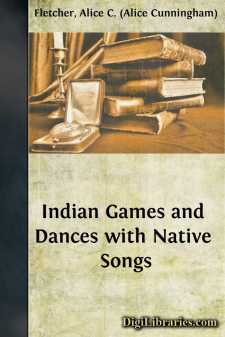Categories
- Antiques & Collectibles 13
- Architecture 36
- Art 48
- Bibles 22
- Biography & Autobiography 813
- Body, Mind & Spirit 138
- Business & Economics 28
- Children's Books 12
- Children's Fiction 9
- Computers 4
- Cooking 94
- Crafts & Hobbies 4
- Drama 346
- Education 46
- Family & Relationships 57
- Fiction 11821
- Games 19
- Gardening 17
- Health & Fitness 34
- History 1377
- House & Home 1
- Humor 147
- Juvenile Fiction 1873
- Juvenile Nonfiction 202
- Language Arts & Disciplines 88
- Law 16
- Literary Collections 686
- Literary Criticism 179
- Mathematics 13
- Medical 41
- Music 40
- Nature 179
- Non-Classifiable 1768
- Performing Arts 7
- Periodicals 1453
- Philosophy 64
- Photography 2
- Poetry 896
- Political Science 203
- Psychology 42
- Reference 154
- Religion 505
- Science 126
- Self-Help 81
- Social Science 81
- Sports & Recreation 34
- Study Aids 3
- Technology & Engineering 59
- Transportation 23
- Travel 463
- True Crime 29
Indian Story and Song from North America
Categories:
Description:
Excerpt
STORY AND SONG OF THE HE-DHU´-SHKA.
It had been a warm September day; and I was resting in my hammock, swung from a wide-spreading tree that stood near the tent of my Indian host. We had partaken of our evening meal beside an outdoor fire. The mother was busy clearing away the supper dishes, the men had gone off to look after the horses, the children had fallen asleep, and I lay watching the shadowy darkness come out of the east and slowly pursue the glowing trail of the retreating sun, thinking of the Indian's imagery of night ever haunting and following upon the track of day, seeking to gain the mastery. I was aroused from my musings by hearing the mother say, "It is chilly!" for the fire had died down, and the deep blue of twilight was all about us.
She dropped beside the embers, blew them into a feeble blaze, threw on fresh wood, that crackled and sent up a shower of sparks and soon bright yellow flames illumined the under side of the branches beneath which I was swinging.
The call of the fire summoned one tall form after another out of the dusky surroundings, and around the blazing logs robes were spread here and there, on which the men reclined. By and by the women came and dropped down near the fire, and added the treble of their voices to the deep tones of the men, as the chat of the day's occurrences went on.
It was a peaceful, picturesque scene upon which I looked; and by very contrast my thoughts reverted to the preceding evening, when I had attended a meeting of the He-dhu´-shka, society composed of warriors. The gathering had been in a large tent; and, as the night was warm, the bottom of the tent cover had been lifted to let the breeze blow through. This had given an opportunity for the crowd outside to look within and watch the ceremony and the dramatic dance. To the right of the door, in two circles around the drum, sat the choir of men and women, all in their gala dress. Each member of the society, wrapped in his robe, with measured steps entered the tent, and silently took his seat on the ground against the wall. The ceremony had opened by the choir singing the ritual song which accompanied the act of charring the elder wood with which the face of the Leader was afterward to be painted. As memory brought back the scene in vivid colours,—the blazing fire in the centre of the wide circle of muffled warriors, the solemn aspect of the Leader awaiting the preparation of the elder wood, and his strange appearance after the painting of his face,—I pondered wonderingly as to what it all might signify. In my perplexity I spoke from my hammock to one of the elder men in the group before me:—
"Grandfather, I wish you would explain to me the meaning of what I saw yesterday at the He-dhu´-shka Society. Tell me why the Leader put black on his face."
My friend was accustomed to my questionings, and all eyes were turned toward him as he replied:
"The Leader put the black cloud over his face, because the black cloud is worn by Thunder when it comes near to man. The song sung while this is being done tells that the Leader is making ready and impatiently awaits the commands of the approaching god of war."......



